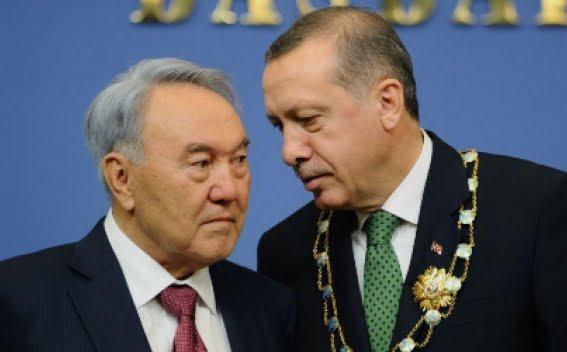Turkish Teachers In Kazakhstan Fear Going Home

Date posted: October 9, 2017
Tony Wesolowsky and Asylkhan Mamashuly
Yakub Doganai came to Kazakhstan from his native Turkey 18 years ago to work as a teacher at a private school in the capital, Almaty.
Like other foreigners, Doganai has had to renew his visa every year, normally nothing more than a bureaucratic nuisance.
Until this year.
“I’ve work at Suleyman Demirel University since arriving in Kazakhstan. For the past two months, I worked at the Eurasian Technological University after being invited to teach there. They tried to extend my visa at the university, but were unable to,” explains Doganai.
And he was not alone.
“About 30 to 40 teachers can’t get visas. Some have expired passports as well. The Turkish Embassy won’t issue them new passports,” Doganai adds.
Finally, the Migration Service of Kazakhstan delivered him the news: Dogania and his family had to leave the country by September 26 due to the expiration of his visa.
Despite promises by Nazarbaev not to return Turkish citizens to Turkey, the country’s bureaucracy is throwing up roadblocks to make it possible to stay in Kazakhstan. Political scientist Aidos Sarim accuses low-level bureaucrats of failing to follow Nazarbaev’s orders.
Like other Turkish citizens in Kazakhstan, Doganai suspects the refusal of Kazakh authorities to extend his visa has nothing to do with his work but rather geopolitics between the two friendly states.
Back home in Turkey, observers say authorities have cracked down on anyone suspected of being connected with last year’s failed coup, arresting and jailing literally thousands.
Amid an atmosphere of fear, suspected sympathizers or supporters of the U.S.-based Turkish preacher Fethullah Gulen have been singled out in what critics liken to a witch hunt.
Turkey accuses Gulen of masterminding the July 15, 2016, coup attempt, a claim he rejects.
Ankara is unconvinced.
And as Doganai’s case attests, it’s not only Turks at home who are being targeted.
“It seems we’re being treated the same way in absentia. But where is Gulen, and where am I?” Doganai asks. “I’m not some youngster who would blindly follow something that was allegedly said by Gulen. I’m a professor with a respectable position.”
But Turkish authorities appear especially suspicious of Turkish citizens working at schools abroad, claiming many of the institutions are linked to Gulen.
In November 2016, Pakistan ordered out more than 100 Turkish teachers who worked at Pakistani-Turkish schools that Ankara accused of having ties with Gulen, something the schools all denied.
In Kazakhstan, there are 27 Kazakh-Turkish lyceums, or private secondary schools. Established by a bilateral 1992 agreement, the schools have a reputation for high academic standards.
Nevzat Uyanyk, the Turkish ambassador to Kazakhstan, claimed in June 2016 that Gulen “cells” were operating in Kazakhstan and called on Astana to shut down any school “linked with Gulen.”
Kazakh President Nursultan Nazarbaev assured Turkish President Recep Tayyip Erdogan in August 2016 that a special commission comprising Turkish and Kazakh specialists would vet the schools.
Shortly after, Kazakhstan Education Minister Erlan Sagadiev announced the institutions were clean, “operating in strict accordance with our standards.”
Later that same year, Nazarbaev announced 11 Turkish teachers had been repatriated to Turkey after their role in the failed coup had been “proven.” He added, however, that those remaining Turkish teachers in Kazakhstan were innocent and would not be sent back unless Ankara provided evidence proving otherwise.
However, such assurances by Nazarbaev, who has ruled oil-and-gas rich Kazakhstan since before the collapse of the Soviet Union in 1991, appear to be increasingly hollow.
The well-known Kazakh scientist Askar Zhumadildaev told the magazine Qazaq Adebieti that, due to the current political climate, 20 Turkish professors with whom he worked at Suleyman Demirel University had left Kazakhstan.
Olzhas Kudaibergenov, an economist and member of the board of trustees at the NurOrda international school, claims teachers returning to Turkey from Kazakhstan face jail without trial or investigations. He has urged Almaty to grant Kazakh citizenship to Turkish teachers.
Doganai says pulling up stakes and leaving Kazakhstan was difficult.
“I have four kids. The oldest is 19; the youngest is 6 years old. It was difficult for me and my wife to deal with having to leave into the unknown. We’re used to Kazakhstan, its language and culture,” Doganai says.
Like others, Doganai denies any role in politics and fears what may await him back in Turkey.
Social media has become an outlet for Turkish teachers in Kazakhstan to share their fears and seek out support.
Anes Kurtai, another Turkish teacher forced to leave Kazakhstan, was pictured in a Facebook post on October 1 posing with his students in an apparent final photo before departing the country.
Kurtai arrived in Kazakhstan in the early 1990s to work as a teacher, social-media posts suggest.
Mustafa Demir worked at a Kazakh-Turkish lyceum before leaving three years ago for Indonesia, where he now lives in Jakarta. He says Ankara has unleashed a witch hunt for suspected supporters of Gulen.
“I haven’t visited my parents in Turkey for three years. There’s no rule of law there. They’ll take us into custody if we go there,” Demir says. “Teachers at schools in Kazakhstan aren’t the only ones affected, but Turkish teachers in Indonesia as well. The Turkish Embassy refused to extend our passports. Now, kids of Turkish citizens who were born in Indonesia don’t have any citizenship.”
Marat Tokashbaev, editor in chief of the pro-government President And People news site, says that despite promises by Nazarbaev not to return Turkish citizens to Turkey, the country’s bureaucracy is throwing up roadblocks to make it possible to stay in Kazakhstan.
“They either need a visa or a residence permit so that they can continue to work here,” Takashbaev explains. “Those who can’t get one or the other have to file for asylum status at the embassies of either Germany or Sweden.”
Political scientist Aidos Sarim says Turkish citizens living in Kazakhstan at least 14 or 15 years could be given political asylum and that 30 to 40 teachers could be granted Kazakh citizenship for their “contribution in the field of education.”
Sarim accuses low-level bureaucrats of failing to follow Nazarbaev’s orders.
“Society and the government have sympathy for the plight of the Turkish teachers,” Sarim says. “But those who have the power to do something about this don’t.”
Written by RFE/RL senior correspondent Tony Wesolowsky on the basis of reporting by RFE/RL Kazakh Service correspondent Asylkhan Mamashuly.
Source: Radio Free Europe , October 8, 2017
Tags: Education | Kazakhstan | Persecution of Hizmet by Erdogan | Turkey |
























